| | In this edition: A $400M satellite deal in DR Congo, Nigeria scraps import levy, currency depreciati͏ ͏ ͏ ͏ ͏ ͏ |
| |  | Africa |  |
| |
|
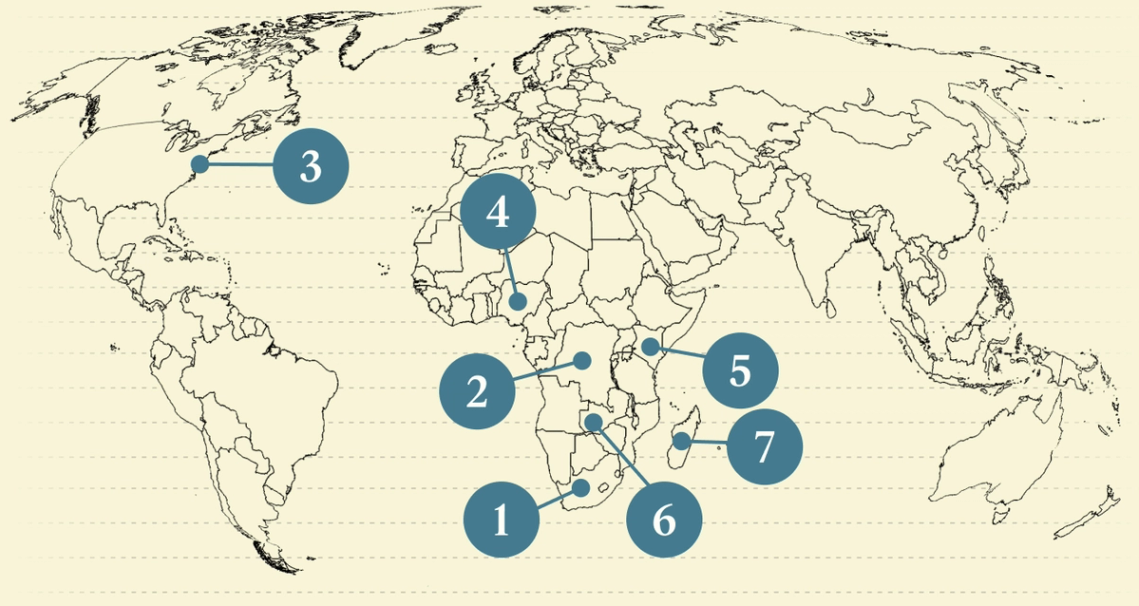 - MTN’s data center talks
- DRC’s $400M satellite deal
- Dangote’s US delivery
- Nigeria scraps import levy
- Currency depreciation costs
- $80B lawsuit in Zambia
- Impact of wildfires
 Mali’s vanishing music scene. |
|
MTN holds data center talks |
 Ralph Mupita, CEO of MTN Group. Lluis Gene/AFP via Getty Images. Ralph Mupita, CEO of MTN Group. Lluis Gene/AFP via Getty Images.Africa telecoms giant MTN is holding talks with US and European firms about building data centers on the continent, a move that could drive the rollout of AI-linked services. MTN’s CEO Ralph Mupita told Bloomberg that the Johannesburg-headquartered company plans to build facilities and secure tenants, while renting out capacity to other businesses and African governments. Africa has fallen behind wealthier regions in the global rush to build the digital infrastructure required for AI, housing less than 1% of the world’s AI data center capacity. Most of Africa’s data centers are concentrated in South Africa, the continent’s largest economy. MTN Group — Africa’s biggest telecoms company by customers and assets — would directly fund part of the investment required, and wants to strike deals with co-investors, companies specializing in AI infrastructure, and hyperscalers. “We are now in the commercial negotiation phase and shortlisting partners who can help us scale,” Mupita said, adding that the company aimed to “conclude these partnerships within the year.” He declined to provide names of the potential partners or the financial details. |
|
DR Congo’s new satellite deal |
  A Starlink satellite dish. Boureima Hama/AFP via Getty Images. A Starlink satellite dish. Boureima Hama/AFP via Getty Images.DR Congo is betting on satellite internet to address one of the world’s worst connectivity deficits, with only one in three Congolese connected to mobile internet. Just three months after approving Elon Musk’s Starlink internet service to operate in the country, the government has turned to Monacosat, a Monaco-based satellite operator co-owned by the Turkmenistan government, to launch a dedicated satellite for broadband internet. Monacosat will also build out satellite infrastructure in the country including control and telemetry stations and rural connectivity links. For now, the financing structure remains unclear. Last month in Kinshasa, Monacosat representative Jean-Philippe Anvam told journalists that a partner bank had “already mobilized up to $400 million” in financing to back the project, and that Nigeria’s Fidelity Bank had signaled interest. Starlink, which received regulatory approval to operate in DR Congo in May, is generally seen as too expensive for most Congolese users, currently priced at around $50 a month with around $200 in equipment costs. Government officials have so far not provided any pricing details of the Monacosat service for consumers. |
|
Dangote Refinery exports to the US |
 Marvellous Durowaiye/Reuters Marvellous Durowaiye/ReutersAfrica’s largest oil refinery has exported its first shipments of gasoline into the United States, marking a new chapter for the country as a major fuel exporter. The first two shipments from the Dangote Refinery were sold separately to Texas energy company Sunoco, and the oil and gas giant Shell, Reuters reported. The exports mark the expansion of the refinery’s operation beyond just the local supply of refined products in Nigeria. The 650,000 barrels-a-day facility began operating last year and has become influential in determining the availability and pricing of gasoline in the continent’s most populous nation. Nigeria, Africa’s top crude oil producer, has for decades imported fuel due to its lack of local refining capacity. Its efforts to build up refining capacity mirror those by other African nations across various commodities — from iron ore processing to gold refining — where governments have sought to add value locally before exporting goods. |
|
Nigeria suspends import levy |
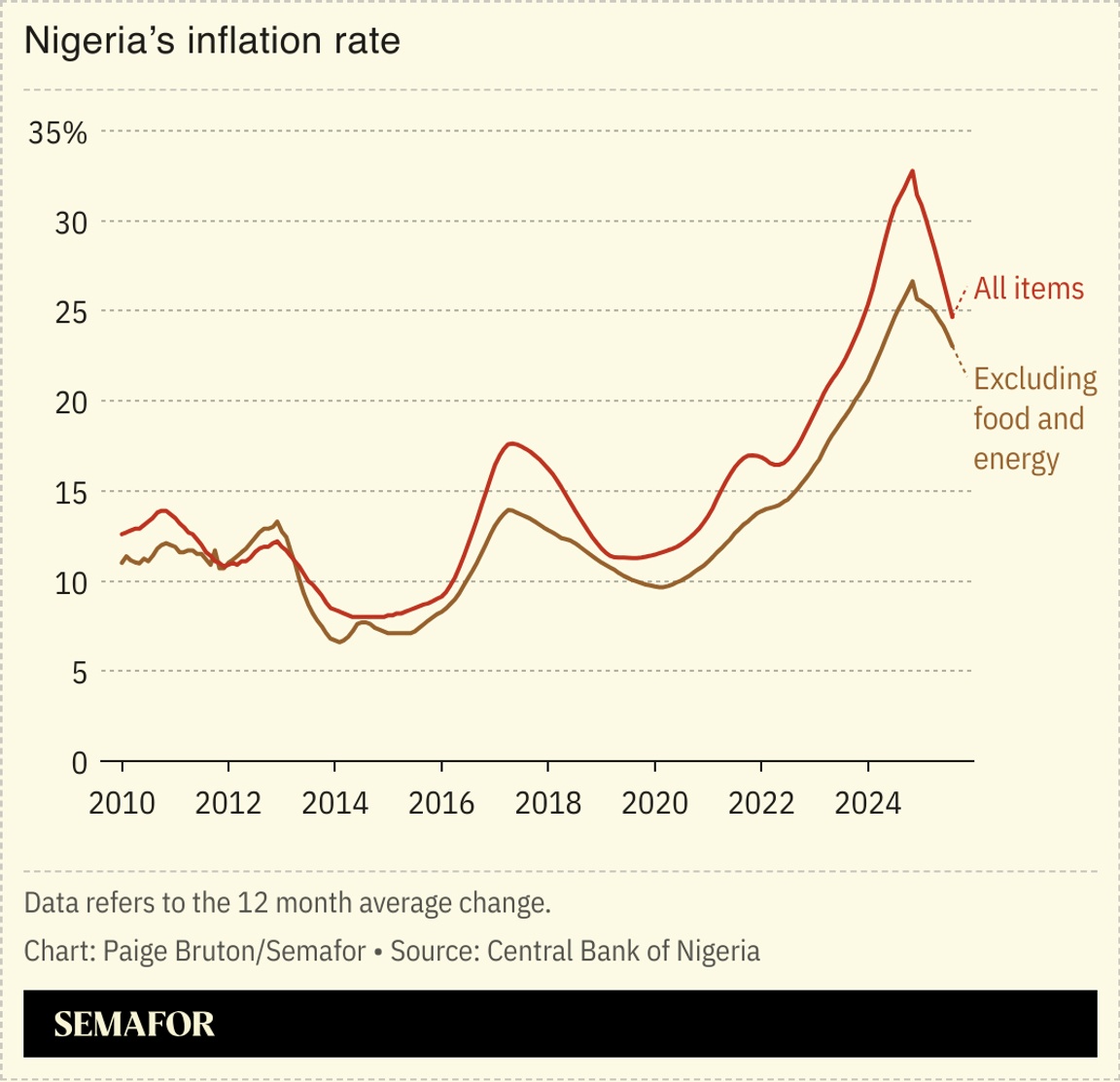 Nigeria suspended a customs levy on all imported goods, citing the tariff’s potentially adverse impact on the government’s push to grow trade and tame inflation. The 4% charge was initially passed two years ago. But interest groups — including clearing agents, importers, and Nigeria’s largest manufacturers’ trade association — criticized it for hindering trade competitiveness and hampering industry. Announcing the tax’s suspension, Finance Minister Wale Edun said it became clear after industry consultations that the levy “poses significant challenges to Nigerian trade facilitation, the business environment, and economic stability.” The levy was introduced as part of Nigeria’s revenue expansion drive, but the government has also made inflation reduction a key goal. Inflation slowed for the fifth consecutive month to 20.12% in August, according to government data. — Alexander Onukwue |
|
Depreciating African currencies |
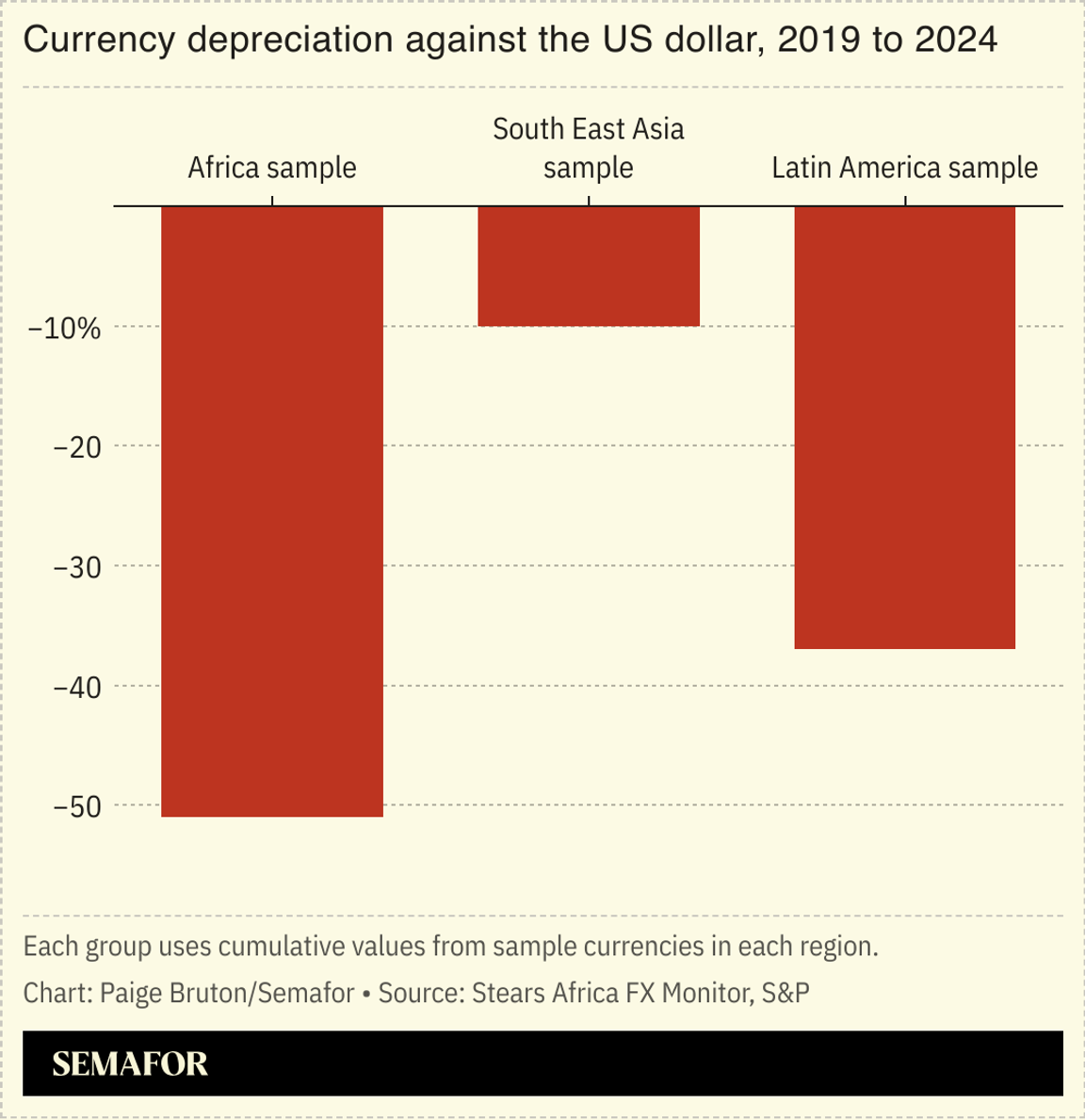 Private equity returns in Africa’s largest economies have fallen short of expectations set in the mid-2010s, in part because foreign investors have struggled with worsening exchange rates against the US dollar, according to Nigerian data analytics company Stears. In the last five years, five of Africa’s biggest economies — Egypt, Ghana, Nigeria, Kenya, and South Africa — experienced a combined currency depreciation of 51% against the dollar, compared to the 2010-2013 period when depreciation was around 17%. While the effects of a strong US dollar have been felt globally, currency weakness in Africa has been “more damaging” compared to other emerging regions, Stears said in a report. However, economic policy changes, particularly in Nigeria and Egypt, are creating a base for more stability. Stears forecasts that depreciation in those five economies will ease to around 15% by 2029, which “should lead to higher USD returns, lower perceived risk, and broader investment opportunities.” — Paige Bruton |
|
Farmers file lawsuit over spill |
 A copper mine in Zambia. Rogan Ward/Reuters. A copper mine in Zambia. Rogan Ward/Reuters.Zambian farmers filed an $80 billion lawsuit against two subsidiaries of Chinese state-owned firms following a huge spillage of toxic waste at a copper mine in February, one of the biggest environmental lawsuits in Zambia’s history. They accuse Sino Metals Leach Zambia and NFC Africa Mining of “engineering failures, construction flaws, and operational mismanagement” over the collapse of a dam that led to millions of liters of acidic material leaking into surrounding rivers, the BBC reported. It is the latest legal case against Chinese mining firms, which have been accused of multiple environmental and human rights violations in their pursuit of the continent’s critical minerals. |
|
Africa wildfires worse than Europe, US |
 The proportion of Africa’s landmass burnt by wildfires in 2024, according to satellite data from the Global Wildfire Information System. That’s compared to just 0.6% of land in both Europe and the US, where the subject draws much more news coverage, reported The Independent. DR Congo, Madagascar, and South Africa recorded some of the worst wildfires this year on the continent, where fire-fighting efforts have been hit by cuts to foreign aid programs. Unlike European countries that share resources to tackle increasingly extreme blazes, limited government budgets mean most African countries, with the exception of South Africa, cannot offer similar arrangements. |
|
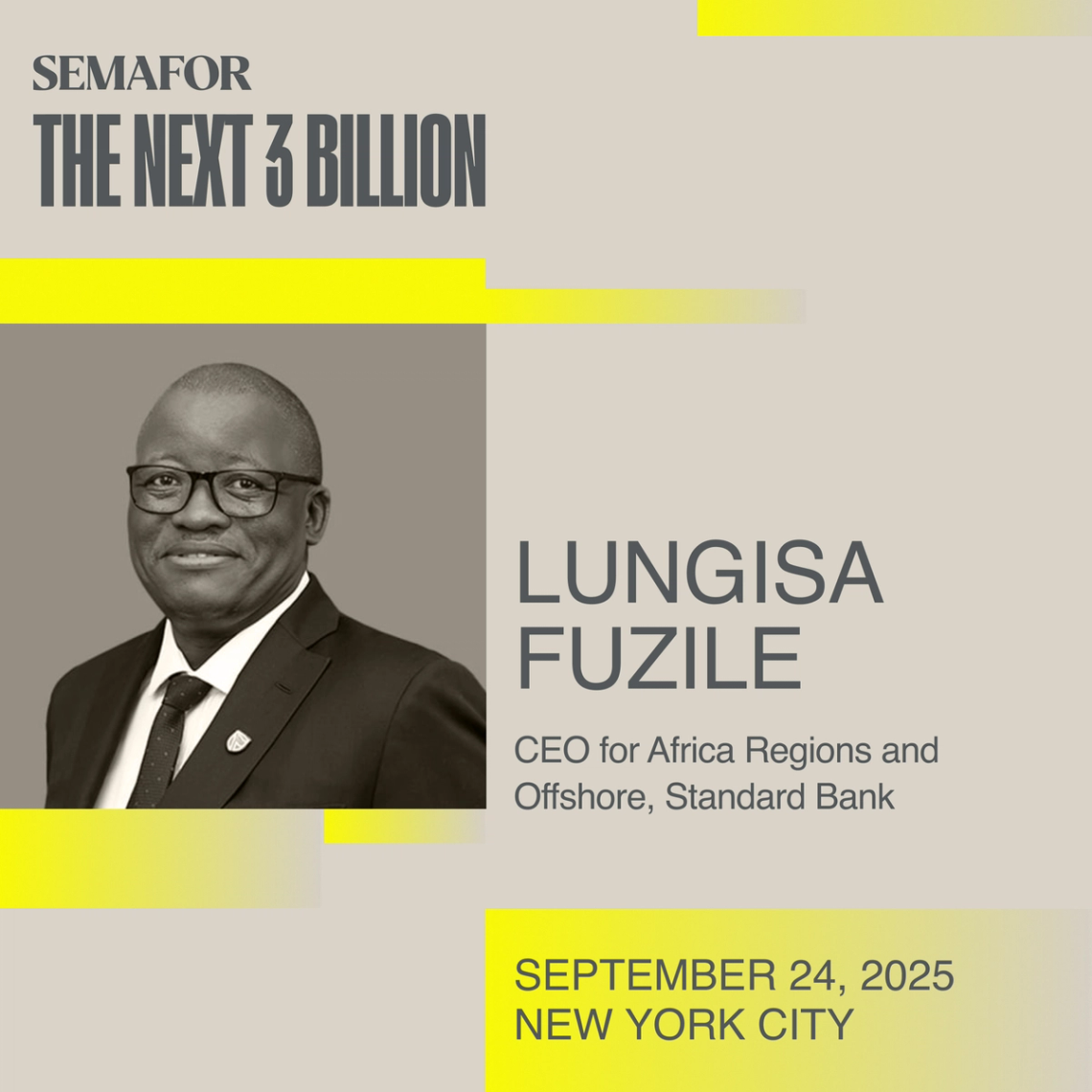 Lungisa Fuzile, CEO for Africa Regions and Offshore, Standard Bank, will join the stage at The Next 3 Billion — the premier US summit focused on closing the global digital divide. Semafor editors will sit down with executives and thought leaders to highlight the economic, social, and global impact of bringing the next three billion people online. September 24, 2025 | New York City | Delegate Application → |
|
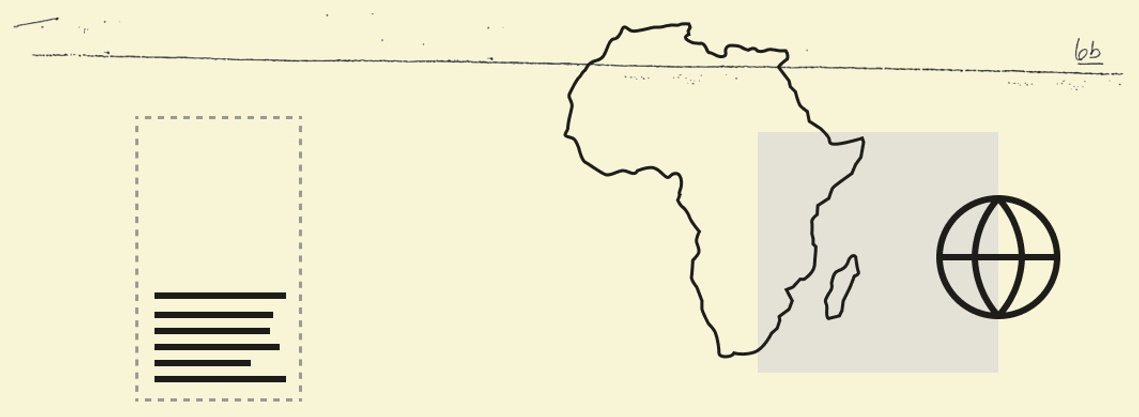 Business & Macro |
|
|